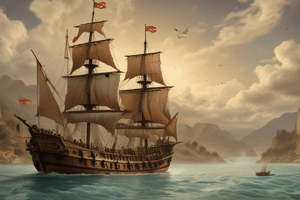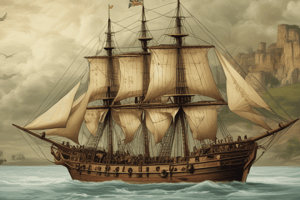Podcast
Questions and Answers
Which era is characterized by the rise of empires and significant cultural achievements?
Which era is characterized by the rise of empires and significant cultural achievements?
- Ancient Civilizations
- Classical Antiquity (correct)
- Middle Ages
- Prehistoric Era
What is the primary focus of social history?
What is the primary focus of social history?
- Review of environmental impacts on society
- Examination of government power dynamics
- Study of ordinary people's lives and social movements (correct)
- Analysis of economic systems
Which historical methodology involves understanding the sequence of events?
Which historical methodology involves understanding the sequence of events?
- Thematic Analysis
- Chronology (correct)
- Contextualization
- Source Analysis
Which of the following best describes the Renaissance period?
Which of the following best describes the Renaissance period?
What is the significance of using primary sources in historical research?
What is the significance of using primary sources in historical research?
Which theme in history examines the interaction between humans and their environment over time?
Which theme in history examines the interaction between humans and their environment over time?
Who is known as the 'Father of History' due to his approach to documenting historical events?
Who is known as the 'Father of History' due to his approach to documenting historical events?
What role do museums play in the study of history?
What role do museums play in the study of history?
Study Notes
Overview of History in Social Studies
- Definition: History is the study of past events, particularly in human affairs.
Key Concepts
-
Timeline of Historical Events:
- Prehistoric Era: Development of early human societies, use of tools, and cave art.
- Ancient Civilizations: Notable for agriculture, writing, government (e.g., Mesopotamia, Egypt, China, Indus Valley).
- Classical Antiquity: Rise of empires (e.g., Greece, Rome), philosophy, democracy, and significant cultural achievements.
- Middle Ages: Feudalism, the spread of religions (Christianity, Islam), and the impact of the plague.
- Renaissance: A rebirth of art, science, and exploration; humanism emerges.
- Modern Era: Industrial Revolution, colonization, world wars, and global integration.
-
Historical Methodology:
- Source Analysis: Distinguishing between primary (original documents, artifacts) and secondary sources (interpretations).
- Chronology: Understanding the sequence of events and their connections.
- Contextualization: Placing events in context to understand their significance and impact.
-
Themes in History:
- Political History: Nation-building, power dynamics, revolutions, and governance.
- Social History: Lives of ordinary people, social movements, cultural trends, and class dynamics.
- Economic History: Trade systems, industrialization, economic theories, and the impact of globalization.
- Cultural History: Art, religion, and philosophies that shaped societies.
- Environmental History: Human interaction with the environment over time and its impact.
Important Figures
- Historians: Researchers who study and interpret past events (e.g., Herodotus, Thucydides, Toynbee).
- Influential Leaders: Figures who impacted history significantly (e.g., Alexander the Great, Cleopatra, Napoleon, Gandhi).
Tools and Resources
- Archives: Collections of historical documents and records.
- Museums: Institutions that preserve and exhibit historical artifacts.
- Digital History: Use of technology and the internet to gather and analyze historical data.
Importance of Studying History
- Understanding Society: Provides insight into how past events shape contemporary issues and societal norms.
- Critical Thinking: Encourages evaluation of sources, perspectives, and the validity of information.
- Civic Awareness: Informs citizens about their rights, responsibilities, and the history of governance and democracy.
- Cultural Identity: Helps societies understand their heritage and promotes appreciation of diversity.
History: A Study of the Past
- Definition: History examines the past events that shaped our world, especially in human affairs.
Key Concepts
- Timeline of Historical Events:
- Prehistoric Era: This era marks the early stages of human civilization, with the development of tools, cave art, and the emergence of early human societies.
- Ancient Civilizations: These civilizations (like Mesopotamia, Egypt, China, and the Indus Valley) are known for advancements in agriculture, writing, and complex government structures.
- Classical Antiquity: This period witnesses the rise of powerful empires like Greece and Rome, known for their contributions to democracy, philosophy, and impressive cultural achievements.
- Middle Ages: Characterized by feudalism, the spread of religions like Christianity and Islam, and the significant impact of the Black Death.
- Renaissance: This period saw a revival of art, science, and exploration, marked by the emergence of humanism.
- Modern Era: This era encapsulates the Industrial Revolution, colonization, world wars, and increasing global integration.
- Historical Methodology:
- Source Analysis: Understanding how sources, like primary (original documents, artifacts) and secondary sources (interpretations) influence historical understanding.
- Chronology: Recognizing the order of events and their relationships to one another to grasp their significance.
- Contextualization: Understanding an event's context, including its setting, contributing factors, and consequences.
- Themes in History:
- Political History: Focuses on the formation of nations, power dynamics, revolutions, and governance.
- Social History: Explores the lives of ordinary people, social movements, cultural trends, and class dynamics.
- Economic History: Examines trade systems, industrialization, economic theories, and the impact of globalization.
- Cultural History: Includes the study of art, religion, and philosophies that have shaped societies.
- Environmental History: Investigates the interaction between humans and their environment over time and its effects.
Important Figures
- Historians: Historians, like Herodotus, Thucydides, and Toynbee, are researchers who study and interpret past events.
- Influential Leaders: Figures like Alexander the Great, Cleopatra, Napoleon, and Gandhi have had profound impacts on history.
Tools and Resources
- Archives: These hold historical documents and records.
- Museums: Institutions that preserve and display historic objects.
- Digital History: Using technology and the internet to gather and interpret historical information.
Importance of Studying History
- Understanding Society: History sheds light on how past events shape contemporary issues and social norms.
- Critical Thinking: Learning from history encourages the ability to critically examine sources, perspectives, and information.
- Civic Awareness: Studying the past provides citizens with knowledge about their rights, responsibilities, and the history of governance and democracy.
- Cultural Identity: It promotes an understanding of heritage and appreciation of diversity.
Studying That Suits You
Use AI to generate personalized quizzes and flashcards to suit your learning preferences.
Description
This quiz covers the fundamental concepts of history as outlined in social studies, highlighting key eras from prehistoric times to the modern era. Test your knowledge on significant events, civilizations, and the methodologies historians use to study the past.




